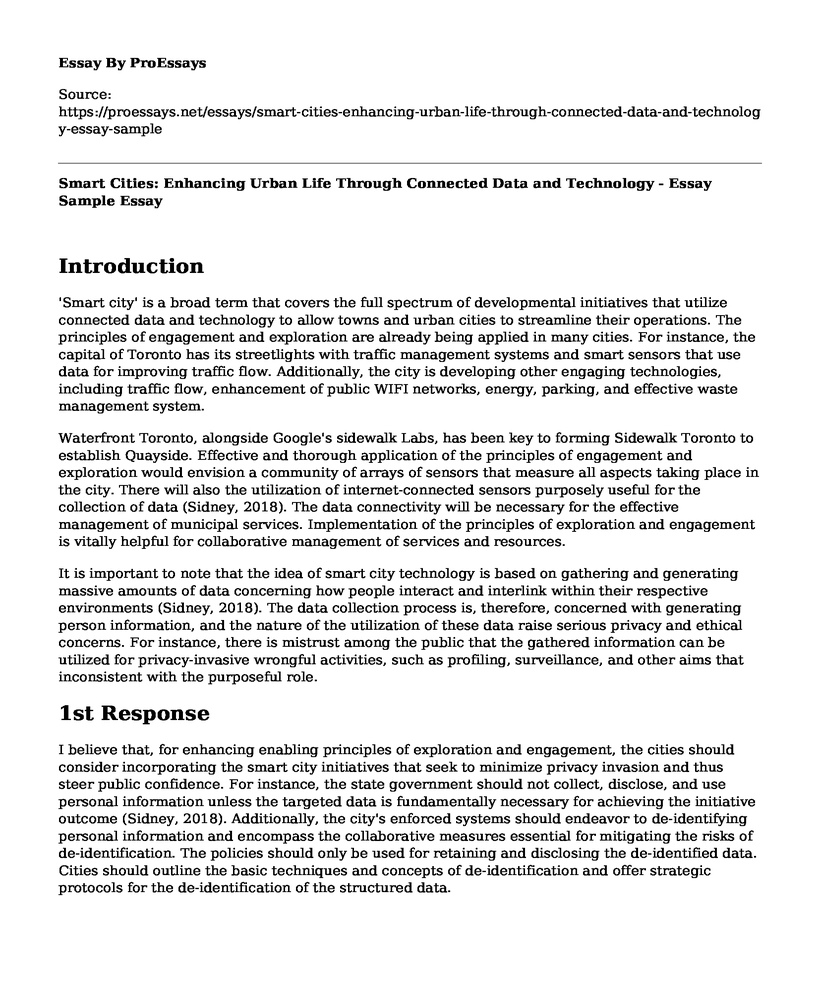Introduction
'Smart city' is a broad term that covers the full spectrum of developmental initiatives that utilize connected data and technology to allow towns and urban cities to streamline their operations. The principles of engagement and exploration are already being applied in many cities. For instance, the capital of Toronto has its streetlights with traffic management systems and smart sensors that use data for improving traffic flow. Additionally, the city is developing other engaging technologies, including traffic flow, enhancement of public WIFI networks, energy, parking, and effective waste management system.
Waterfront Toronto, alongside Google's sidewalk Labs, has been key to forming Sidewalk Toronto to establish Quayside. Effective and thorough application of the principles of engagement and exploration would envision a community of arrays of sensors that measure all aspects taking place in the city. There will also the utilization of internet-connected sensors purposely useful for the collection of data (Sidney, 2018). The data connectivity will be necessary for the effective management of municipal services. Implementation of the principles of exploration and engagement is vitally helpful for collaborative management of services and resources.
It is important to note that the idea of smart city technology is based on gathering and generating massive amounts of data concerning how people interact and interlink within their respective environments (Sidney, 2018). The data collection process is, therefore, concerned with generating person information, and the nature of the utilization of these data raise serious privacy and ethical concerns. For instance, there is mistrust among the public that the gathered information can be utilized for privacy-invasive wrongful activities, such as profiling, surveillance, and other aims that inconsistent with the purposeful role.
1st Response
I believe that, for enhancing enabling principles of exploration and engagement, the cities should consider incorporating the smart city initiatives that seek to minimize privacy invasion and thus steer public confidence. For instance, the state government should not collect, disclose, and use personal information unless the targeted data is fundamentally necessary for achieving the initiative outcome (Sidney, 2018). Additionally, the city's enforced systems should endeavor to de-identifying personal information and encompass the collaborative measures essential for mitigating the risks of de-identification. The policies should only be used for retaining and disclosing the de-identified data. Cities should outline the basic techniques and concepts of de-identification and offer strategic protocols for the de-identification of the structured data.
2nd Response
I believe it would be necessarily recommendable for the cities that seek to implement the principles of engagement and exploration to consider coming up with initiatives that support the policies that address the security and privacy requirements (Alex, 2013). The procedures should seek to enhance auditing and monitoring for compliance, appointing the privacy lead, and breach response.
Additionally, there must be contractual accountability and protections for the parties involved in the smart city implementation plans. The threat risk assessments and privacy impact assessments are crucial tools for helping ensure that the security risks and privacy issues are collaboratively identified and adequately addressed (Sidney, 2018). The design of the new programs and technologies should align with the public expectations by ensuring that their data are not compromised or collected for ill-will intentions. Project transparency and community engagement - the local government must strive to ensure transparency and help the community members to understand how the programs will affect them.
References
Sidney Fussell. (2018). "The City of the Future is a Data-Collection Machine," The Atlantic. Retrieved from https://www.theatlantic.com/technology/archive/2018/11/google-sidewalk-labs/575551/
Alex Pentland. (2013) "The Data-Driven Society," Scientific American. Retrieved from https://connection.mit.edu/sites/default/files/publicationpdfs/data%20driven%20society%20sci%20amer_0.pdf
Cite this page
Smart Cities: Enhancing Urban Life Through Connected Data and Technology - Essay Sample. (2023, Mar 13). Retrieved from https://proessays.net/essays/smart-cities-enhancing-urban-life-through-connected-data-and-technology-essay-sample
If you are the original author of this essay and no longer wish to have it published on the ProEssays website, please click below to request its removal:
- The Effect of World Oil and Gas Crises on the Economic Condition of Oman Paper Example
- What Is Disruptive Innovation? Essay Example
- Essay Example on Bioenergy: Harnessing Solar Energy Through Biomass
- Privacy Protection in Modern Research - Paper Example
- Essay Sample on Innovation Process: Open & Closed Approaches to Problem-Solving
- Alternative Fuels: Growing Demand, New Solutions - Essay Sample
- Essay Example on Renewable Energy: Averting Global Warming & Collateral Damage







